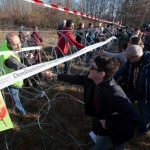ZAGREB, June 5, 2018 – Croatia can cope with migrant pressure on its borders in cooperation with neighbouring countries, Croatian Minister of the Interior Davor Božinović and European Migration, Home Affairs and Citizenship Commissioner Dimitris Avramopoulos said in Luxembourg on Tuesday.
“It is important to explain to countries in our neighbourhood the importance of border control and management as one of preconditions for EU accession. We will organise at the European Commission very soon a meeting with ministers of the interior of the countries along the so-called Balkan migration route, at which they will be told what is expected of them. Very lively diplomatic activity is under way, and only that can yield real results,” Božinović said after talks with Avramopoulos, held on the margins of a meeting of the Justice and Home Affairs Council.
Avramopoulos said that he could understand that Croatia was under pressure but that he was confident the situation would stay under control in cooperation with neighbouring countries. He noted that Božinović was one of the main protagonists of the EU’s migration policy and commended his contribution to debates on the matter.
As other EU countries, Croatia, too, can count on the EC’s full financial, political and practical support, if the need arises and if it requests it, said the European commissioner.
Božinović said the EC could best help Croatia by working intensively with countries on the Balkan route. “Croatia is strong enough and has adequate capacity to do the job without any major problems, even in a situation we have been witnessing lately, when the influx of migrants has been on the rise,” said the minister. He said that the increased influx of migrants could be prevented only with active contribution from Greece, Macedonia, Albania, Montenegro, Serbia and Bosnia and Herzegovina.
Pointing to Croatia’s humane approach to migrants as well as to its resolve to protect its borders, which are also the EU’s external borders, Božinović said: “All who arrive illegally arrive from safe third countries. Croatia does not border on Afghanistan, Pakistan or Iran. It borders with safe third countries that as such have been put on lists of safe third countries and we expect them to act accordingly, and that refers primarily to implementation of agreements on readmission, which is the best legal way to put the whole process under control,” Božinović said.
He described as unrealistic reports that some EU member countries could send back to Croatia tens of thousands of illegal migrants. “Those figures are unrealistic. A few days ago we took back 50 people for whom there is clear evidence that they had passed through Croatia,” said the minister.
Božinović and Fabrice Leggeri, executive director of the European border and coast guard agency Frontex, signed in Luxembourg today a memorandum of understanding on the deployment of a Frontex liaison officer in Croatia. The liaison officer’s role is to help obtain a more clear understanding of what is happening on the EU’s external borders.
“We have been explaining persistently that the standards of dealing with the migrant crisis on the external borders have to be raised,” Božinović said, adding that he and Leggeri also discussed the possibility of putting into operation a centre in Spačva, eastern Croatia, as a training centre for Frontex.








